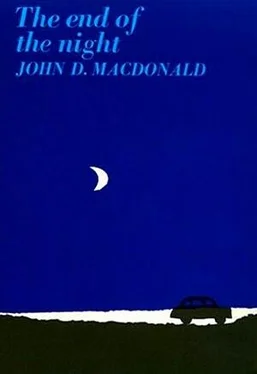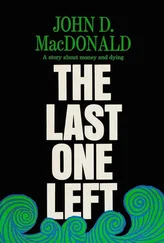We were on the road by ten-thirty. I had a dull headache. John Pinelli had a head cold. Kathy wore white shorts, a black blouse, red sandals, and sunglasses with white frames.
I had sworn I would not let her play her nasty game again. I would be a man, not a trained animal. In that way I rationalized my wish to stay with her. I waited in tension for the chance to repulse her, but nothing happened on that second day in Mexico. We stopped at four-thirty that afternoon, a half day short of Mexico City. The motel was very much like the first one. March flowers were growing, with a sweet spoiled scent, heavy in the air.
At dusk I met Kathy. I was going toward my room. She was headed for the bar. There was a narrow walk, roofed, with open arches on one side, a wall on the other. I saw her coming toward me in a cotton dress with a bold, broad stripe, her hair brushed out to long smooth silver, molten in that half light. I saw her and the sight of her hollowed my belly, hurried my pulse.
“Kathy,” I said, and she gave a mild half nod and attempted to walk by me, but I imprisoned her there, bracing my hands on the warm stone wall on either side of her. She put her shoulders against the wall, folded her arms close under her breasts and looked up at me, her head slightly tilted, her expression one of weary patience. She was a small-boned woman, quietly arrogant. I suddenly felt humble and awkward and unsure of myself. All resentment was gone.
“I suppose I gave you the right to make a nuisance of yourself, Kirby,” she said. “Could you possibly manage to forget it, dear?”
“Tell me why. I just want to know why.”
“There isn’t any ‘why.’ Even if I had all the words, there isn’t any why. Once I threw a painting into the fireplace. John had paid ten thousand dollars for it. He didn’t ask me why I did it. On impulse I’ve done things that would make your little-boy face turn green, darling. And I haven’t asked myself why. My God, we don’t go around checking motives. You brought up the idea of following me down here. You invited yourself. We both know you’re all steamed up for a nice romp. Who asks you why? Don’t ever bore me asking why.”
“What do you think that did to me, Kathy?”
“I couldn’t care less. I had no curiosity. Then, or now, dear.”
“John is probably taking a nap. Why don’t you come to my room right now, Kathy?”
She put her fist to her mouth. I could not guess whether the yawn was real or faked. It hurt as much either way.
“As if I owe it to you or something?” she demanded with a trace of anger. “One of those dull cause and effect things? Follow through? Little man, if you go through life looking for any kind of logic in sexual relationships, you’re going to raise lumps all over that boyish head, believe me. You don’t have any sort of claim on me, Stassen. I owe you nothing, college boy. Just drive the car. And if you must have a reason, just tell yourself the lady gets bored on trips. Stop collecting motivations, or buy a couch and go into the business.”
“I’m a person, Kathy. I’m not a object, or an experiment.”
She had looked withdrawn. She suddenly used her actress face, and it came alight with tender, theatrical concern. “Oh, have I hurt you, my darling? My God, how thoughtless of me! How cruel and selfish and heartless! I swear, my love, it will never, never happen again.”
She ducked under my arm quickly and was gone. I took a hesitant step after her. She looked back, and with a quick expression of malicious mockery, an extra switch of her hips, she disappeared around the corner of the wall.
It did not happen again. I knew it would not have happened at all had not the climate of their marriage changed so abruptly and finally in Laredo, that ugly, shabby, tawdry border city.
We drove to Mexico City. They took a suite in the Continental Hilton. I assumed that he wanted to put on a look of importance for the people he wanted to get in with. I didn’t meet any of them there. I met some of them later in Acapulco. I was provided a room in the Francis, across from the new Sanborn’s, near the Embassy. I didn’t get much time in Mexico City. They decided to stay a few days and then fly down to Acapulco. I would drive down alone. I had the Chrysler serviced again. I helped Kathy unload the basic clothes she would need in the city — about a hundred pounds of them.
I left early the second morning, knowing only that I had to locate the house of a man named Hillary Charis. There would be servants there. I had gathered that Hillary had made his money out of some kind of wide screen lens. He and his newest wife were away, wintering in Montevideo. On the afternoon before I left, Kathy, in her most to-the-manor-born manner and accent, had given me the word. “Here are two thousand pesos, Stassen. I shall expect you to keep an accounting of it. Drive on down and unpack the car and get settled in. I understand there are five bedrooms, so there’s no reason why you shouldn’t move in for a little while. Please don’t select the most attractive guest room because we shall be doing some entertaining. Purchase any little things you think we’ll need to be comfortable there. You know our schedule, so you can get the household operating properly. Make sure the utilities are all in working order. When we’re ready to come down, we’ll phone you when to meet us at the airport. Is that all quite clear?”
“Yes, sir, Mrs. Pinelli, sir!”
“Really, Stassen, I did employ you to drive us down, did I not?”
“Yes.”
“It’s so much easier to be able to give orders than to have it all on... a loose sort of friendship basis, don’t you think?”
“If you say so, Kathy.”
“Have a pleasant trip, Kirby.”
“Thank you, ma’am.”
So faithful, loyal, reliable Stassen went booming up the auto pisto into the high mountains on the day of April Fool, and over the highest pass, and then down and down, ridge by ridge, all day long, down through the tierra Colorado , down to the rich tropic beach.
I found the beach home of Hillary Charis. It was west of the city. It was a pale, faded blue with a red tile roof. It sat about fifty feet above the highway, on a ledge of solid rock. The big garage had been cut out of the solid rock. The garage door could have served a fortress. From the garage level you climbed one hundred wide, flat, curving, concrete stairs up to the house. My first view of the wide blue Pacific at sunset from one of the terraces was like being hit solidly behind the ear. My jaw sagged and I felt as if I would stagger. Fishing boats were headed in. You could see the exotic hotels of Acapulco to the east.
I came to know the house well, its moods and vistas. The biggest and most dramatic terrace was on the south side, overlooking the sea. There were tile floors thoughout the house, and plaster walls in cool shades of green and blue and lavender. Soil had been carried up to make small garden pockets around the house, tended by Armando who seemed to live on his knees. He was a knotted old man, rosewood brown, seamed and eroded, with bad teeth and one milky, sightless eye. His wife was Rosalinda, the cook. She was a timeless Indian woman, square as an up-ended box. Her face had the impassive features of an aging hero of many Westerns. It gave her an almost comic look, as though, through some convolution of the plot, Our Hero had dressed in pink cotton and a horsetail wig the better to make his escape. When she smiled, a slow blooming smile, it was a glorious thing to see.
I had a phrase book and two years of college Spanish. Rosalinda had perhaps fifty words of English, and a striking talent for pantomime. We could understand each other. Armando made no attempt at communication. They both came down when I arrived. By burdening ourselves like burros, we were able to unload the car with but two trips up the hundred stairs. Armando fell immediately in love with the black car. He circled it, hissing softly. He linked hoses together so the water would reach, and washed it lovingly with soft rags and polished it until it was dazzling.
Читать дальше







![Джон Макдональд - The Hunted [Short Story]](/books/433679/dzhon-makdonald-the-hunted-short-story-thumb.webp)


